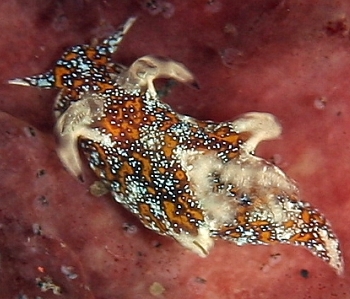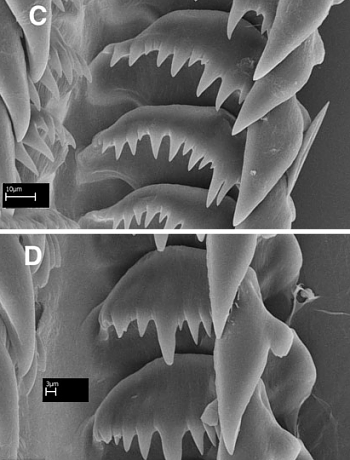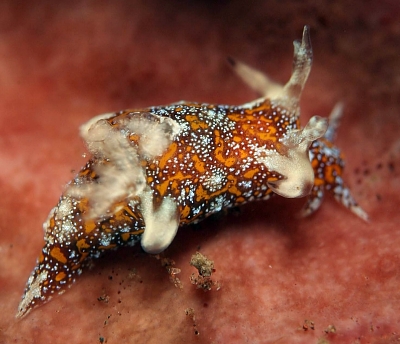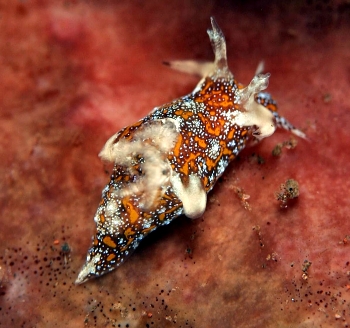

Trapania miltabrancha
Gosliner & Fahey, 2008
Order: NUDIBRANCHIA
Suborder: DORIDINA
Superfamily: ANADORIDOIDEA
Family: Goniodorididae
DISTRIBUTION
Known only from Bali, Indonesia.
PHOTO
Upper: Tulamben, 10 meters, Bali, Indonesia, 30 January 2007, rubble slope. Length: 1 cm. Photographer: Brian Francisco. Lower: CASIZ 172862. Radular morphology. C. Scale =10 µm. D. Scale =3 µm. [From Gosliner & Fahey 2008: Fig 31C,D].
The background colour is brownish orange covered with an irregular reticulate pattern of dark brown. Scattered all over the dark brown are small opaque white spots. The tentacular foot corners cannot be seen in photographs, but the oral tentacles are brown with small white spots and the dorso-lateral processes are translucent white with a brownish tip. The rhinophores and gills are transparent with some straw coloured and dark brown patching.
The species name miltabrancha is based on the Greek words for 'red gill' because Gosliner & Fahey consider the species to have 'pale red gill leaves'. This is not clear to me in their published photo or Brian Francisco's photo which I have used for the Fact Sheet.
The living animal is reported to grow to at least 10 mm in length.
Note: This species was previously known on the Forum as Trapania sp. 11
-
Gosliner, T.M. & Fahey, S.H. (2008) Systematics of Trapania (Mollusca: Nudibranchia: Goniodorididae) with descriptions of 16 new species Systematics and Biodiversity, 6 (1): 53-98
Rudman, W.B., 2008 (March 10) Trapania miltabrancha Gosliner & Fahey, 2008. [In] Sea Slug Forum. Australian Museum, Sydney. Available from http://www.seaslugforum.net/find/trapmilt
Related messages
Trapania miltabrancha from Bali, Indonesia
July 9, 2008
From: Brian Francisco

Concerning message #19513:
Hi Bill
It's great to see that Trapania sp.11 now has a proper name. Attached are three additional photos to add to the record.
Locality: Tulamben, 10 meters, Bali, 30 Jan 2007, rubble slope. Length: 1 cm. Photographer: Brian Francisco.
Cheers
Brian
francisco.brian@gmail.com



Dear Brian,
Thanks for the extra photos, and although you didn't realise thanks for confirming the food of this species. In your reply [#19557] to my comments about species of Trapania eating kamptozoans you say you'll be off trying to photograph kamptozoans. Looking carefully at one of these photos I have found two zooids which clearly confirm that these objects with 2 black spots are definitely kamptozoans. The two arrows I have added point to zooids which show the feeding tentacles just like Neilsen's drawing on the kamptozoan Fact Sheet. So I guess we can say that Trapania miltabrancha is another species of the genus which eats kamptozoa.
Best wishes,
Bill Rudman
Re: Unidentified Trapania from Tulamben
February 28, 2007
From: Brian Francisco
Note added 12 March 2008: This species has been named Trapania miltabrancha
Concerning message #19513:
Bill
Thanks very much for your comments on the Trapania. Now I am going to be out trying to photograph kamptozoans!
Brian
francisco.brian@gmail.com
Francisco, B., 2007 (Feb 28) Re: Unidentified Trapania from Tulamben. [Message in] Sea Slug Forum. Australian Museum, Sydney. Available from http://www.seaslugforum.net/find/19557Dear Brian,
Good Luck! That's a big as they get.
Bill Rudman
Unidentified Trapania from Tulamben
February 28, 2007
From: Brian Francisco

Note added 12 March 2008: This species has been named Trapania miltabrancha
Hi Bill
We have another unidentified species from Tulamben and would appreciate your help.
Locality: Tulamben, 10 meters, Bali, Indonesia, 30 January 2007, rubble slope. Length: 1 cm. Photographer: Brian Francisco.
Thanks very much.
Brian
francisco.brian@gmail.com
Francisco, B., 2007 (Feb 28) Unidentified Trapania from Tulamben . [Message in] Sea Slug Forum. Australian Museum, Sydney. Available from http://www.seaslugforum.net/find/19513
Dear Brian,
In general shape this is a species of Trapania. I can't recall one with a colour pattern like this so I assume it is another unnamed species.
One interesting feature in your photo is that scattered over the reddish sponge are whitish blobs which each have a pair of small black spots in them. I have ringed one of them. There are almost certainly small animals called kamptozoans or entoprocts whhich we now know are the food of species of Trapania. These kamptozoans are often found living on certain sponges, which is why the Trapania are often found on such sponges.
Best wishes,
Bill Rudman
